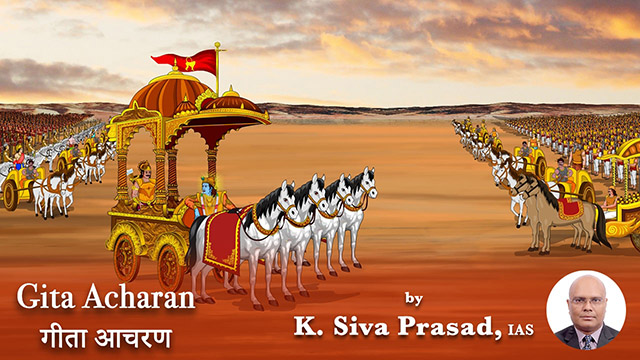
After describing 𝙮𝙖𝙜𝙣𝙖 and 𝙩𝙖𝙥𝙖𝙝 in the context of 𝙜𝙪𝙣𝙖𝙨 , Krishna talks about 𝙙𝙖𝙖𝙣 (charity) and says, "Charity which is done, knowing it to be a duty, without consideration of anything in return, in a fit time and place, to a worthy person is considered to be 𝙨𝙖𝙩𝙫𝙞𝙠 " (17.20). There are multiple prescriptions in this verse.
Firstly, Krishna earlier mentioned that yoga is not for one who eats too much or doesn’t eat at all nor for one who sleeps too much or keeps awake (6.16). Essentially, it is being appropriate while keeping the circumstances in mind. During times of illness, one's food intake reduces and conversely, goes up after a physically strenuous day. This indicates that appropriateness depends on time and place. Thus, this verse suggests that appropriateness entails going with the flow and adapting to the circumstances.
Secondly, it is being appropriate with regards to the person to whom 𝙙𝙖𝙖𝙣 is being made. It's like how countries who hold dual technologies such as nuclear technology don't share it with the countries who may misuse it. In the olden days, a guru wouldn't teach a powerful 𝙩𝙖𝙣𝙩𝙧𝙖 (technique) to a student till they were convinced that it would be used for the welfare of society.
Finally, ' 𝙙𝙖𝙖𝙣 as duty' is a very complex issue as it raises doubts about what is duty and what is not. A seed coat's duty is to protect the seed and subsequently, destroy itself to give way to the sprout. Hence, understanding duty is no easy task.
Krishna further says, "That 𝙙𝙖𝙖𝙣 (charity) is deemed 𝙧𝙖𝙟𝙖𝙨𝙞𝙘 which is given with reluctance, with the hope of a return or in expectation of a reward (17.21). Charity, which is given at the wrong place and wrong time to unworthy persons, without showing respect, or with contempt, is said to be 𝙩𝙖𝙢𝙖𝙨𝙞𝙘 in nature" (17.22).
https://epaper.dailyworld.in/Details.aspx?id=142360&boxid=77952&uid=&dat=2024-07-28

